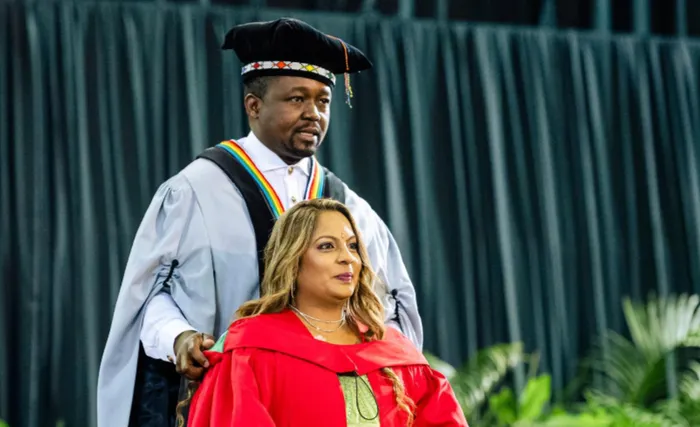Integrating mental health into physiotherapy: Dr Marilyn Hooblaul's vision for change
PHD GRADUATE

Dr Marilyn Hooblaul was awarded her PhD in Physiotherapy at the University of KwaZulu-Natal’s 2025 Spring Graduation ceremony.
Image: Supplied
HAVING witnessed the inadequacies in the training of physiotherapists for psychiatric contexts ignited PhD-graduate Dr Marilyn Hooblaul’s ambition to bring about change.
Hooblaul, 43, of Isipingo, was awarded her PhD in Physiotherapy at the University of KwaZulu-Natal’s (UKZN) 2025 Spring Graduation ceremony last week.
She said her research developed a framework for the inclusion of mental health into the undergraduate physiotherapy programme, a first-of-its-kind study in South Africa.
Hooblaul, the chief physiotherapist at Ekuhlengeni Psychiatric Hospital, said her study revealed that mental health content in undergraduate physiotherapy curricula is currently minimal, fragmented, and inconsistent across the country.
She was supervised by Professor Thayananthee Nadasan and Dr Oladapo Michael Olagbebi, who are senior lecturers in the School of Health Science's Discipline of Physiotherapy at UKZN.
“The phases of the PhD, conducted with academics, clinical supervisors, students and community service officers, identified significant knowledge gaps and a lack of confidence in managing patients with mental illness.”
Her research culminated in a framework aimed at equipping future physiotherapists with necessary skills for treating both physical and mental health conditions, improving patient outcomes through holistic, person-centred care, reducing stigma within healthcare settings, and strengthening the healthcare system’s ability to respond to South Africa’s mental health burden.
Hooblaul, who initially intended on studying pharmacy, said her passion for this field was born from her 15-year career at the hospital, where she realised that physiotherapists were not adequately prepared to work in psychiatric settings.
“I knew how to treat muscles, joints, and movement problems, but I had no roadmap for working with people living with severe mental illness. The question ‘how much more could we do if we were trained for this?’, became the driving force behind my PhD.”
Hooblaul said she draws inspiration from her husband and two children, to persevere and achieve.
She said, however, balancing work, family and her doctoral studies was no small feat.
“There were days when I wanted to quit, but I reminded myself that I was doing this for my profession, and for my mental health care users at Ekuhlengeni.”
Hooblaul added that she was grateful to her family, colleagues, and the Deans and supervisors at UKZN’s College and School of Health Sciences for their unwavering support.
She said her future plans are to influence curriculum development at institutional and national levels, mentor young professionals, and continue cross-disciplinary research to ensure mental health is addressed alongside physical health in healthcare training.
Her message to aspiring health professionals is, “No matter your age or gender, if you set your mind to do something, see it through. Education is central to your life.”
Hooblaul has published four papers in peer-reviewed journals and presented two international papers at the European Society of Physical and Rehabilitation Medicine conference in Slovenia and the World Congress of Physiotherapy held in Cape Town.
Related Topics: